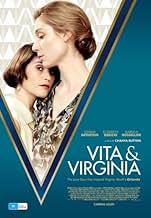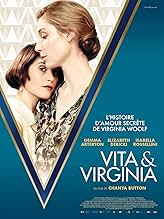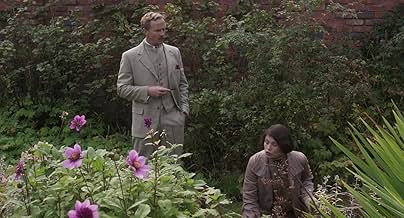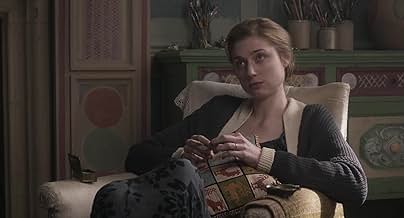IMDb-BEWERTUNG
5,9/10
5174
IHRE BEWERTUNG
Es ist die faszinierende wahre Geschichte über die Liebesaffäre zwischen der sozialistischen und populären Autorin Vita Sackville-West und der Literaturikone Virginia Woolf.Es ist die faszinierende wahre Geschichte über die Liebesaffäre zwischen der sozialistischen und populären Autorin Vita Sackville-West und der Literaturikone Virginia Woolf.Es ist die faszinierende wahre Geschichte über die Liebesaffäre zwischen der sozialistischen und populären Autorin Vita Sackville-West und der Literaturikone Virginia Woolf.
- Auszeichnungen
- 1 Gewinn & 2 Nominierungen insgesamt
Empfohlene Bewertungen
I have never in my life heard such a wrong music for a particular film. while the costumes, scenography and everything else is aiming to be realistic, historical, MUSIC is completely unrelated to any of that...it doesn't communicate in any way with the rest of the film. it makes it very hard to watch, creates distraction.
Greetings again from the darkness. The historical landscape of relationships is littered with the remains of artist couples who began with a cosmic connection and ended with a sonic boom. Add in the socially toxic matter of same-sex attraction from a century ago, and you have a starting point for the romance-friendship-inspiration between writers Vita Sackville-West and Virginia Woolf. Director Chanya Button co-wrote the script with Eileen Atkins, and it's adapted from Ms. Atkins play and the personal letters of Virginia and Vita ... correspondence that covered many years and hundreds of letters.
Gemma Arterton (TAMARA DREWE, 2010 and QUANTUM OF SOLACE, 2008) stars as writer Vita Sackville-West, a successful poet, novelist, and columnist. Vita was also known for her free spirited ways, and sometimes scandalous behavior. Virginia Woolf is played by Elizabeth Debicki ("The Night Manager", THE GREAT GATSBY), and she does really nice work capturing the troubled genius, and the glimmers of hope during her time with Vita. The two women were so very different in their approach to life and writing, although each faced their own challenges.
We see their first meeting, and the immediate enchantment that occurs as their eyes meet across the room. However, what makes their relationship interesting is the long and winding path to consummation. The interesting parts come as Vita toys with the fragile Virginia, though it's clear their connection is quite strong. Though the connection was strong, the relationship was quite complex. Vita was a fan of Virginia's talent. Virginia was an admirer of Vita's strength and confidence. They seemed to push each other - sometimes for the better, other times for the worse.
The film opens as Ms. Woolf's book "Jacob's Room" is being typeset and printed. It's quite an artistic way to show the mechanics of the process, and credit goes to Cinematographer Carlos De Carvalho for a segment that would typically be little more than filler. We learn about Vita's secretly "open" marriage to diplomat Harold Nicholson (Rupert Penry-Jones) and her constant battle with her mother Lady Sackville (Isabella Rossellini) over scandals and the family reputation. Virginia's husband Leonard (Peter Ferdinando) runs their printing business, and is seen as vital to his wife's emotional stability, despite the void in other marital aspects. Virginia's artist sister Vanessa Bell (Emerald Fennell) is quite an interesting character whose backstory (also a part of the Bloomsbury Group) is teased enough that she might deserve her own film.
The film features a couple of memorable lines of dialogue, both spoken by Vita. During a BBC radio program she boldly claims "Independence has no sex", and in an early discussion with Virginia states "Popularity is no sign of genius". Vita's brazen step traveling as a man with her previous lover Violet Keppel is mentioned, but mostly this is focused on the class differences and the 'snatched moments' for Vita and Virginia. Vita's exotic spirit and Virginia's struggle with mental health are made clear (even using special effects for the latter). "Visions" of conversations bring the words on the letter pages to life, though it does seem that the filmmakers played things a bit too safe in order to capture a mainstream audience. The music of Isobel Waller-Bridge (Phoebe's sister) brings a contemporary feel but it's at times in contrast to the high gloss presentation. For the women who wrote and inspired the amazing novel "Orlando", and led one of the more tumultuous historical lesbian affairs, it could be argued that they deserved a bit more risk taking on the big screen. Still, "X" marks the spot for Virginia's writing room, and we do understand why discretion might be the right call.
Gemma Arterton (TAMARA DREWE, 2010 and QUANTUM OF SOLACE, 2008) stars as writer Vita Sackville-West, a successful poet, novelist, and columnist. Vita was also known for her free spirited ways, and sometimes scandalous behavior. Virginia Woolf is played by Elizabeth Debicki ("The Night Manager", THE GREAT GATSBY), and she does really nice work capturing the troubled genius, and the glimmers of hope during her time with Vita. The two women were so very different in their approach to life and writing, although each faced their own challenges.
We see their first meeting, and the immediate enchantment that occurs as their eyes meet across the room. However, what makes their relationship interesting is the long and winding path to consummation. The interesting parts come as Vita toys with the fragile Virginia, though it's clear their connection is quite strong. Though the connection was strong, the relationship was quite complex. Vita was a fan of Virginia's talent. Virginia was an admirer of Vita's strength and confidence. They seemed to push each other - sometimes for the better, other times for the worse.
The film opens as Ms. Woolf's book "Jacob's Room" is being typeset and printed. It's quite an artistic way to show the mechanics of the process, and credit goes to Cinematographer Carlos De Carvalho for a segment that would typically be little more than filler. We learn about Vita's secretly "open" marriage to diplomat Harold Nicholson (Rupert Penry-Jones) and her constant battle with her mother Lady Sackville (Isabella Rossellini) over scandals and the family reputation. Virginia's husband Leonard (Peter Ferdinando) runs their printing business, and is seen as vital to his wife's emotional stability, despite the void in other marital aspects. Virginia's artist sister Vanessa Bell (Emerald Fennell) is quite an interesting character whose backstory (also a part of the Bloomsbury Group) is teased enough that she might deserve her own film.
The film features a couple of memorable lines of dialogue, both spoken by Vita. During a BBC radio program she boldly claims "Independence has no sex", and in an early discussion with Virginia states "Popularity is no sign of genius". Vita's brazen step traveling as a man with her previous lover Violet Keppel is mentioned, but mostly this is focused on the class differences and the 'snatched moments' for Vita and Virginia. Vita's exotic spirit and Virginia's struggle with mental health are made clear (even using special effects for the latter). "Visions" of conversations bring the words on the letter pages to life, though it does seem that the filmmakers played things a bit too safe in order to capture a mainstream audience. The music of Isobel Waller-Bridge (Phoebe's sister) brings a contemporary feel but it's at times in contrast to the high gloss presentation. For the women who wrote and inspired the amazing novel "Orlando", and led one of the more tumultuous historical lesbian affairs, it could be argued that they deserved a bit more risk taking on the big screen. Still, "X" marks the spot for Virginia's writing room, and we do understand why discretion might be the right call.
The characters speak in cryptic tongues, and I just don't understand the story. Everything else is beautiful from the sets to the costumes. Too bad I just cannot connect with the main characters at all.
First, let me say I'd go see Gemma Arterton reading the phone book: she has the rare facility of being able to play period stories as well as contemporary ones. She's great as Gemma Bovery and the Duchess of Malfi. She's well supported by Isabella Rossellini as Lady Sackville who tries without success to call Vita back to reality.
Second, what quirk of casting gave us Elizabeth Debicky, not yet thirty, as Virginia Woolf who started her three-year relationship (1925-28) with Vita at age 43? She just can't carry off the part of a woman in early middle age, and what's more she has this irritating drawl/vocal fry that put me off for most of the picture. So if you wish to see this interesting story, be aware it's been handled before (Portrait of a Marriage, The Hours) and sometimes better.
Second, what quirk of casting gave us Elizabeth Debicky, not yet thirty, as Virginia Woolf who started her three-year relationship (1925-28) with Vita at age 43? She just can't carry off the part of a woman in early middle age, and what's more she has this irritating drawl/vocal fry that put me off for most of the picture. So if you wish to see this interesting story, be aware it's been handled before (Portrait of a Marriage, The Hours) and sometimes better.
The play on which this movie is based works well on stage. A couple of actors bring to life the letters of Virginia Woolf and Vita Sackville-West. It's simple and effective. The flim also uses the letters as the basis of the script, but the screenplay hasn't converted the literary tone into something speakable. The result is a thick porridge of words that doesn't sound remotely like living language . Even the best performance -- and it really is excellent -- by Elizabeth Debecki as Mrs Woolf, can't escape from the impossible pretension of the stuff coming out of her character's mouth. The accents, too, even Debecki's, have clearly been tirelessly worked on and worked over: few people sound real or believeable. Less accomplished cast members (of whom there are several) haven't a hope.
The film as a whole is similarly stilted. In spite of occasional (and welcomely effective) poetic visual flourishes, the film is so freighted with the weight of period frocks, settings and props, that it never takes flight. Only Isobel Waller-Bridge's music, liberated from period accuracy, escapes the self-consciousness that paralyses other departments.
The worst aspect of this tedious movie is that it takes the Bloomsbury set at their own estimate. This one's a genius, that one's a rebel, she is daring, he is boring....Whatever their talents may or may not have been, they are presented, uncritically, as so wrapped up in themselves, so hopelessly removed, in their privilege bubble, from the daily grind of the society around them, that there's no reason at all to be interested in their self-regard and self-induced melodramas.
A very poor effort indeed.
The film as a whole is similarly stilted. In spite of occasional (and welcomely effective) poetic visual flourishes, the film is so freighted with the weight of period frocks, settings and props, that it never takes flight. Only Isobel Waller-Bridge's music, liberated from period accuracy, escapes the self-consciousness that paralyses other departments.
The worst aspect of this tedious movie is that it takes the Bloomsbury set at their own estimate. This one's a genius, that one's a rebel, she is daring, he is boring....Whatever their talents may or may not have been, they are presented, uncritically, as so wrapped up in themselves, so hopelessly removed, in their privilege bubble, from the daily grind of the society around them, that there's no reason at all to be interested in their self-regard and self-induced melodramas.
A very poor effort indeed.
WUSSTEST DU SCHON:
- WissenswertesBoth this film and the play on which it is based were derived from letters between Vita Sackville-West and acclaimed author Virginia Woolf.
- PatzerDriving in a convertible with the top down, neither woman has windblown hair.
- Zitate
Harold Nicolson: I hear nothing but reports of her madness.
Vita Sackville-West: Madness, what a convenient way to explain away her genius.
- VerbindungenFeatured in London's Hollywood: Welcome to Pinewood (2006)
Top-Auswahl
Melde dich zum Bewerten an und greife auf die Watchlist für personalisierte Empfehlungen zu.
- How long is Vita & Virginia?Powered by Alexa
Details
- Erscheinungsdatum
- Herkunftsländer
- Offizieller Standort
- Sprache
- Auch bekannt als
- Eine extravagante Liebe
- Drehorte
- Produktionsfirmen
- Weitere beteiligte Unternehmen bei IMDbPro anzeigen
Box Office
- Bruttoertrag in den USA und Kanada
- 42.741 $
- Eröffnungswochenende in den USA und in Kanada
- 3.408 $
- 25. Aug. 2019
- Weltweiter Bruttoertrag
- 800.675 $
- Laufzeit1 Stunde 50 Minuten
- Farbe
- Seitenverhältnis
- 1.85 : 1
Zu dieser Seite beitragen
Bearbeitung vorschlagen oder fehlenden Inhalt hinzufügen


![Trailer [OV] ansehen](https://m.media-amazon.com/images/M/MV5BZDRkNTdiN2MtNzE4MC00NDU1LThjOTMtMTA0YzEyYmQwOThlXkEyXkFqcGdeQXRyYW5zY29kZS13b3JrZmxvdw@@._V1_QL75_UX500_CR0)





































